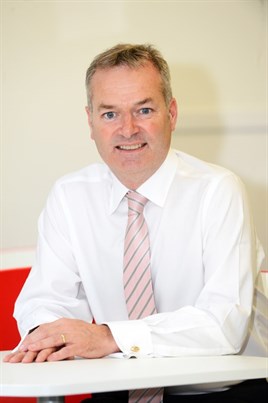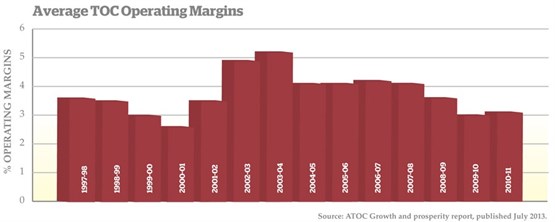His view is that, notwithstanding the West Coast collapse, we have a model that works, and that now the franchise procurement procedures have been so robustly fixed by Interim Franchising Director Pete Wilkinson (now Director of Franchised Passenger Services), we should get moving with confidence.
The interregnum caused by the West Coast collapse has cost at least two years, and we have seen no fewer than seven Direct Awards - effectively extensions of existing franchises. These have secured improvements for passengers and kept the ship afloat, but the franchising behemoth that was becalmed by West Coast really needs to start rolling again with confidence, he says. RDG and its members will continue to lobby and inform governments (whoever is in power, he says), and they will deal with whatever regime emerges.
“That’s the way the world is,” he shrugs.
Privateer fat cats
On that subject, how does he intend to deal with the public perception (fuelled relentlessly by the unions, in pursuit of their state ownership agenda) that the industry is run by uncaring, arrogant privateer fat cats who make excessive profits from rip-off fares and put absolutely nothing back?
“You’re right, we really are up against it here,” he acknowledges. “We have to keep communicating the positive story about what the industry is actually delivering. To the average man on the street, the real misconception - which is just wrong - is of high fares, high profits, and greedy capitalists…
“Actually it isn’t like that at all. There has been £3.5 billion of additional revenue in UK rail since 1986/87, and 94% of that growth has come from increased passenger volume. A very small amount has come from fares.
“Profits (and we do need to make profits, actually!) over the last few years have gone up 2%-3%, and in real terms profits are less today than what they were in 1986/87. And to be honest, I don’t think we make enough profit for the risk management time that we put in.”
Stagecoach is known for its very tough financial philosophy and approach. If that’s true and you’re unhappy with the margins, why is the company still here in railways?
“Because I still think from a shareholder point of view it’s a good industry, and now with the right structure, and so we can make a sensible return despite it being a very different business from the bus business.”
So relatively low returns are OK because they are stable over a long period?
“Yes, it’s steady. And in absolute terms it’s still a decent number, which justifies the management time we put into it.”
We return to fares, because Griffiths is clearly sore at what he believes are wrong impressions about TOCs. And he’s bullish on justifying some First Class fares.
“Yes - some fares relatively have gone up, but there are also plenty of great discounted fares now. But here’s another argument. The Germans and French have subsidised their First Class and business fares for years and years - but I believe that we shouldn’t do that.
“If a businessman wants to walk up ‘on the day’ to travel and go First Class on my train to Manchester, and it costs him £370 - so what? We shouldn’t subsidise that. If a well-heeled businessman wants to pay high fares for on-the-day travel, then we should not have a problem with that.
“What’s important is that with a bit of forward planning and thinking, if someone wants to go off-peak or plans their journey well, they can get a huge discount. That’s the model I aspire to, and I have no problem with that.”
But what if this means a creeping threat, and the eventual end of the affordable walk-on railway?
“I don’t think that will happen.”
I recall an early morning CrossCountry peak trip from York to Derby on a Friday - standing all the way on an overcrowded train, with multiple en route reservations of seats. It was a horrible journey.
“Certainly, there are challenges around capacity,” he agrees. “I accept that, and we are a victim of our own success in that sense. So how do we make the railway fit for the growth that is going to come over the next 20/30 years?
“But go back to the man on the street, which is the challenge. Ten or so years ago the Labour government made the call to change the funding of the railway, and it was probably the right call.”
I passionately disagree that going from a 50/50 share with the taxpayer to 75/25 was most certainly not ‘the right call’, with its inherent implication that those who do not use trains derive no benefit from the railway. That is arrant nonsense.
“Well, it’s been successful in the sense of changing the financial economics of the funding of the railway,” counters Griffiths. “But I do take your point regarding some individual passenger journeys. But while that was what they set out to do, we could reverse that tomorrow, Nigel!”
50/50 fares split
Really? Would RDG oppose Government policy, and campaign on that to go back to the 50/50 fares split with the taxpayer?
“You do build sustainable transport businesses on low fares.”
So that’s a yes, then?
“Absolutely! Yes, it’s a ‘yes’ - although it comes with a ‘but’ too,” he says. “And the but is this: if you take the Stagecoach business model over a long, long period, it’s all about volume, low fares, more demand, investment.













